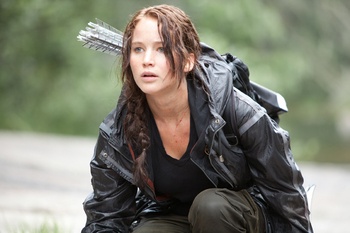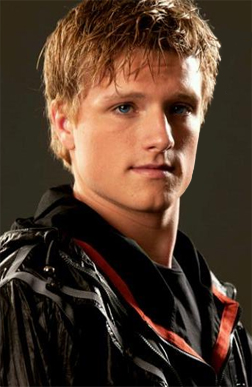This is a topic I’ve been wanting to write about for awhile. One of the things that really drew me into the Hunger Games is the way Suzanne Collins portrays gender roles. I think her characterization of Peeta might be the best thing that’s happened to YA in a while, because it gives a male lead another identity other than the stereotypical “alpha male” portrayal. Peeta is by no means an alpha male, a lumberjack, or a fabled hero. In fact, he and Katniss really do a role reversal in what we expect our female and male leads to be like. After doing a quick Google search, I realize that many other people have had pretty varied thoughts on gender in the Hunger Games series, including Psychology Today and a bit in the New York Times that discusses Katniss as a female hero. While these made me happy to find, most of what I found related to trends in our culture. I had trouble finding things about how gender roles actually reverse in the books, so I wanted to outline my thoughts on this subject.
There are several characters throughout the book that defy literary gender norms in some way, including Finnick, Johanna, etc. However, since Katniss and Peeta are the ones where gender reversal really shines through, that’s what I’m going to be concentrating on.
Let’s look at the traits Katniss has that are stereotypical “male” traits:
- She’s the hunter, while Peeta is the gatherer
- She kills with a bow & arrow(decently close-range) and is the one who kills more often
- She is less openly emotional
- She is less romantic
- She is more likely to use things for her own personal benefit
- She’s the one more set on survival
- She comes up with the plans once her & Peeta are together
- She’s the one who thinks of using the nightlock to best the Capitol at the end of the games
- She hunts, cooks, & cleans
- She uses less words– she’s not as good with words and language as Peeta is
On the flip side, Peeta is potrayed in the following manner:
- He gathers while Katniss hunts
- His only kill in the 74th hunger games was an accident(unless you count the girl at the beginning, but we don’t know if he really killed her– it happens off-screen). It was also by poison, which is interesting. My dad is a criminal investigator and has always told me that women are most likely to kill someone or commit suicide by poison.
- He is more openly emotional. He lets the world see him cry. He tells Katniss how he feels about her, even when he knows the entire country is watching.
- He is more romantic. Katniss is portrayed as having never given much thoughts to boys until the beginning of the book. Even in the book, she really only thinks about it because she has to play a role for the cameras. Peeta’s had a crush on Katniss most of his life.
- He is a baker. He’s physically strong, but in a different way than Gale, who might be considered the traditional male lead model.
- He’s a creator. He frosts the cakes at the bakery, he paints, he draws, etc.
- He’s kind. He throws the burnt bread to Katniss.
- He’s the more passive one in the relationship. Katniss takes charges. Partially because Peeta is injured, but also partially because that’s the way their personalities would play out in most circumstances.
- He’s better with words and language. He’s portrayed as most likely having a high verbal intelligence.
Of course, these gender stereotypes are not true across the board in most books. It’s rare to see a female lead whose going to portray all those traditionally feminine roles, or vice-versa. However, the majority of the time, main characters more of less stick to our traditional notion of gender identity with a few exceptions. Peeta and Katniss have such a clean role reversal of gender stereotypes that I’m convinced Suzanne Collins did it intentionally.
It’s important to note that neither Katniss or Peeta come across as particularly masculine or feminine. They have plenty of these traits, yes, as I’ve listed above. However, just because Katniss is portrayed as having traditional masculine characteristics doesn’t mean she’s portrayed as a masculine women. In fact, she’s not. The same goes with Peeta. No one ever says or insinuates that Katniss is masculine, and I don’t think most readers would even realize it until they finished the book and really thought about it. It doesn’t hit you over the head right away. Peeta has qualities that we perceive as being more feminine, but he’s never portrayed as feminine in-universe. No one ever tells Peeta that he’s a wuss or that he needs to “man up”. The closest we get to this is in Catching Fire, when Finnick says that no one’s a victor by accident, except maybe Peeta. In that case, it’s because of Peeta’s heart, not his masculinity or lack thereof, that Finnick makes the statement.
Peeta potrays hope for Katniss, and she tell us as much:
What I need is the dandelion in the spring. The bright yellow that means rebirth instead of destruction. The promise that life can go on, no matter how bad our losses. That it can be good again. And only Peeta can give me that.
Peeta is the “dandelion in the spring”. That is not a metaphor you would expect to normally be applied to a male lead. You normally wouldn’t expect a male in a story to be compared to any sort of flower. When we see flower metaphors in literature, they are almost always about women.
Another example is this quote that Peeta says to Katniss in Catching Fire:
I wish I could freeze this moment, right here, right now and live in it forever.
This isn’t as fully obvious as the previous comparison of Peeta being a dandelion in the Spring, but I think it still fits. In most cases, I can see either a female or romantic lead saying this. There are other male literary characters I think would say this sentence to their love interest. What it symbolizes, though, is Peeta’s emotional openness, in response to Katniss’ sometimes lack of emotion. After Peeta says this, Katniss even admits that such admissions normally make her uncomfortable, even though she’ll go with it for the day. Can you really imagine most female characters saying that such a sentence makes them uncomfortable? I think most female characters would love to hear something like this. Once again, Peeta is playing the role we typically associate with women, while Katniss takes the masculine role.
One last thought before this gets too long:
Katniss chooses Peeta. Now, the Hunger Games is about so much more than the love triangle, and I hate when that’s all anyone can focus on! However, I feel it needs to be at least pointed out. Katniss has a choice in Mockingjay, between Peeta and Gale. Peeta, being the not-so-stereotypical male lead, and Gale, the “alpha male” type. There are other factors that influence this decision of course, mainly what happens in the last forty pages of Mockingjay. Who does Katniss choose? Not the typical male lead who is so similar to Katniss herself, but Peeta, the kind-hearted baker, the “dandelion in the Spring”.
It’s amazing how skillfully Suzanne Collins was able to reverse gender stereotypes in a way that doesn’t seemed force. Katniss and Peeta portray certain characteristics, but they aren’t defined by those characteristics. Katniss and Peeta are both themselves, in a story where gender stereotypes really have no place. I’m hoping this trend continues in the future, because I think if more authors let go of the ways we sometimes subtly define gender in literature, there will be a much more interesting and dynamic cast of characters in young adult fiction.
Follow-Up: One of the blog posts I found when looking to see what other people had written about gender identity and the Hunger Games was this really spectacular piece on gender identity in the Hunger Games as it relates to theological thinking of God. If theology interest you at all, I recommend checking it out.
Any thoughts on gender stereotypes & the Hunger Games?




Pingback: Top Ten Tuesday: Top Ten Fictional Characters I would Crush On | Book.Blog.Bake.
Very interesting and thought provoking post 🙂 I think what makes this series so perfect for me is that no character is perfect, they all have flaws. Especially Katniss but she is so feisy and brave that you have to love her. An excellent lead character to inspire young girls.
Pingback: Top Ten Tuesday: Top Ten Favorite Romances | Book.Blog.Bake.
Pingback: The One Month Wrap-Up | Book.Blog.Bake.
I really enjoyed your post. I sort of noticed the things u talk about, but not to the extent that u brought them out. Fascinating! I remember when they still had “reapings” in America, they called it the draft. I was in high school in the Vietnam war and worried i might get drafted, so this post and the movie seemed rather intense to me. For hundreds of years children have been going off to war. My dad joined the army when he was 17, he lied about his age and they didn’t care. In many countries male children much younger than 18 join the army, fight and die. Of course, men are worthless in our world, so as long as they are boys or men, it doesn’t matter if they die.
Pingback: 2013 Feminist Read Challenge + Social Justice Theme Read | Book.Blog.Bake.
Once you pointed out the different ways Suzanne Collins reverses traditional gender roles, it totally makes sense! I definitely agree that Katniss doesn’t come across necessarily as masculine; her narrative clearly indicates this, and neither does Peeta come across as feminine. I think this represents a move towards androgyny: women are allowed to portray masculine characteristics and men are allowed to act more “feminine” without being labelled as such. You can see it in fashion and the media especially. The only thing I would contradict is Peeta being the “creator”; men are traditionally seen as creators (theologically comparing them to God, the Creator), and women are associated with nature, something that men can own or “tame.” I think in this way Katniss asserts that male characteristic of ownership over nature by hunting, but Peeta reinforces a traditional masculine role through the act of creation.
Ah, good point about men being the creators–which would explain why I felt that wasn’t the word I was looking for when I was writing the post! I think I was trying to appeal more to Peeta’s artistic side, though now that I think of it, artistic is one of those characteristics I’m not sure has a stereotypical gender bias–more that he paints and frosts the cakes in the bakery. Thanks for pointing that out!
I totally agree with the artistic side of his personality being a gender swap, especially with cake decorating 😀
Interesting post! Hadn’t really thought about the traditional gender roles and if they were reversed, but you make several good points. I just really enjoyed Katniss as a strong female lead.
My Saturday Situation
Gotta love the strong female leads! One of my favorite things in the book world to discuss, probably!
I hadn’t really thought about how the gender roles were reversed in the Hunger Games, but it makes perfect sense. Katniss is definitely more of an alpha male than a typical heroine.